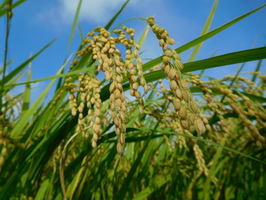
Rice Plants Engineered for Better Photosynthesis Make More Rice
January 16, 2019| |
 A study published in the journal Molecular Plant reports that a new bioengineering approach for boosting photosynthesis in rice plants could increase grain yield by up to 27%. Called GOC bypass, the approach enriches plant cells with CO2 that would otherwise be lost through photorespiration. The genetically engineered plants were greener and larger and showed increased photosynthetic efficiency and productivity under field conditions, with particular advantages in bright light.
A study published in the journal Molecular Plant reports that a new bioengineering approach for boosting photosynthesis in rice plants could increase grain yield by up to 27%. Called GOC bypass, the approach enriches plant cells with CO2 that would otherwise be lost through photorespiration. The genetically engineered plants were greener and larger and showed increased photosynthetic efficiency and productivity under field conditions, with particular advantages in bright light.
The main genetic approach in increasing the yield potential of major crops focuses on photosynthesis. One way to increase photosynthesis is to bypass photorespiration, a light-dependent process in which oxygen is taken up and CO2 is released. Several studies conducted in the past introduced photorespiratory bypasses into plants, but most of the experiments were carried out using Arabidopsis. In the new study, the research team developed a strategy to essentially divert CO2 from photorespiration to photosynthesis. They converted a molecule called glycolate, a product of photorespiration, to CO2 using three rice enzymes: glycolate oxidase, oxalate oxidase, and catalase. To deploy GOC bypass, which was named for the three enzymes, the researchers introduced genes encoding the enzymes into rice chloroplasts.
The results showed that the photorespiratory rate was suppressed by 18%-31% compared to normal, and the net photosynthetic rate increased by 15%-22%, primarily due to higher concentrations of cellular CO2 used for photosynthesis. Compared to plants that were not genetically engineered, the GOC plants were consistently greener and larger, with an above-ground dry weight that was 14%-35% higher. Moreover, starch grains grew in size by 100% and increased in number per cell by 37%. In the spring seeding season, grain yield improved by 7% to 27%.
For other details, read the paper's abstract.
| |
Biotech Updates is a weekly newsletter of ISAAA, a not-for-profit organization. It is distributed for free to over 22,000 subscribers worldwide to inform them about the key developments in biosciences, especially in biotechnology. Your support will help us in our mission to feed the world with knowledge. You can help by donating as little as $10.
-
See more articles:
-
News from Around the World
- Blueprint for Plant's Immune Response has been Found
- Scientists Identify How Plants Sense Temperature
- Research Finds Extreme Opponents of GM Foods Know the Least but Think They Know the Most
- NRGene and Toyota Decode Strawberry Genome to Develop Better Varieties
- Approval of Monsanto's GM Cotton Seed Patent to Boost India's Biotech Industry
- Mechanism Behind Plant Memory has been Unraveled
- Improved Crops Can Double Agricultural Production in Europe
- EFSA: GM Maize (MON 89034x1507xMON 88017x59122xDAS-40278-9) and Soybean (A2704-12) are Safe for Release
-
Research Highlights
- Rice Plants Engineered for Better Photosynthesis Make More Rice
- Meta-analysis of Soil Enzymatic Responses to Bt Crops
-
Beyond Crop Biotech
- Gene-edited Tilapia Not Classified as GMO in Argentina
- Biotechnology to Possibly Address Forest Health Problems
-
Resources
- Bt Brinjal: The Bangladesh Experience
-
Plant
- Scientists Report Functionally Diverse Type V CRISPR-Cas Systems
- Gene Editing for Developing GM Spicy Tomatoes
-
Read the latest: - Biotech Updates (February 11, 2026)
- Gene Editing Supplement (January 28, 2026)
- Gene Drive Supplement (February 22, 2023)
-
Subscribe to BU: - Share
- Tweet
